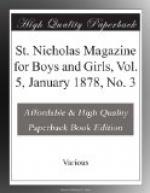“Better, we hope. Certainly better than he was yesterday. He has not as yet shown any gleam of consciousness, but he has been able to take plenty of nourishment, and it is upon this that we ground a good hope. But see, yonder comes the doctor, and I hope he will report favorably of all.” Never could a medical man have shown a greater interest in a patient than Dr. Henderson did in Digby. He had heard portions of his strange story from others of his patients who had been saved from the ill-fated ship, and the loving solicitude of all had drawn from him an answering tenderness.
“I shall stay with him to-night,” said he, “if you will allow me, for I anticipate a change in him soon, and I am extremely anxious that at first he should receive enough information to satisfy him, and at the same time that he should have no clue as to where he is or by whom he is surrounded. After his intense excitement and the almost superhuman fatigue he has undergone,—for it was he who was the last to give up, and then not until the Hughsons were safe aboard the ship,—the least shock might prove fatal. So, you go away and leave me with him. But stay,” added the doctor to Mr. Morton, who had now joined them; “just now one of the men gave me this book—a Bible—which he found on the ship; and as it bears the name of Howard Pemberton in the fly-leaf, I brought it with me, and with especial interest, for, inclosed in the cover, is a packet addressed to you, Mr. Morton.”
Mr. Morton took the book with trembling hands, and when he had reached his own room he sat alone and read with deep emotion the strange story of his son’s life. It ran as follows:
Baffin’s Bay.
I know not into whose hands this paper will fall, but it is my earnest, perhaps dying entreaty that it may be placed in the hands of my parents, my sister, Dr. Brier, or Howard Pemberton, all of whose addresses will be found elsewhere.
I write this letter to the
man whose name I bear and whom I have
most deeply wronged.
Much sorrow, and anxiety, my dear father, must have resulted from my cruel conduct, and I would confess, without a wish to conceal one single fact, the sins which wrought such mischief and have brought such strange punishments. I can only do so by telling the story of how one sin led to another, until all culminated in that fearful fraud, the pretense of death.
For the first year that I was at Blackrock school I strove with all my strength to do and be what Dr. Brier and his kind, good wife would wish. Their influence over me was kind and gentle and good. I can never repay the debt of gratitude I owe them. But by degrees I grew to hate the restraints of school, and I was drifting, drifting, I knew not whither.
My best friends at school were Howard Pemberton and Martin Venables. I loved them at the first with all the enthusiasm a boy feels




